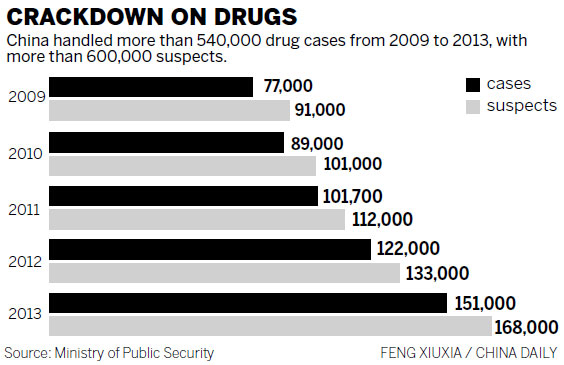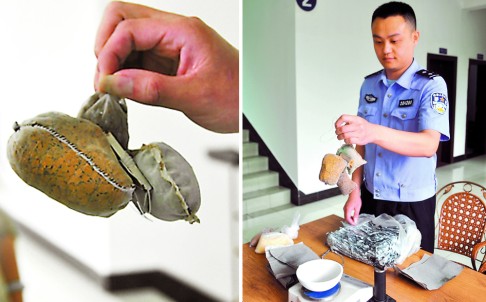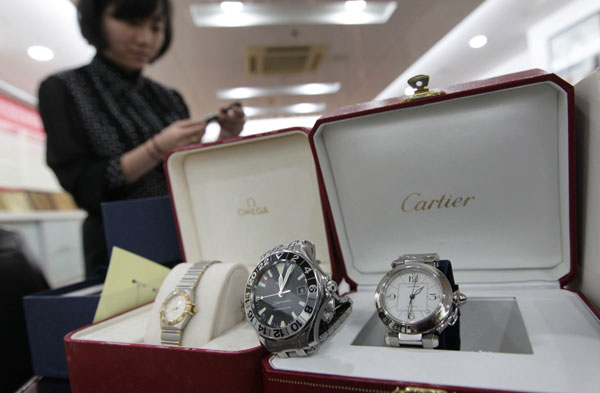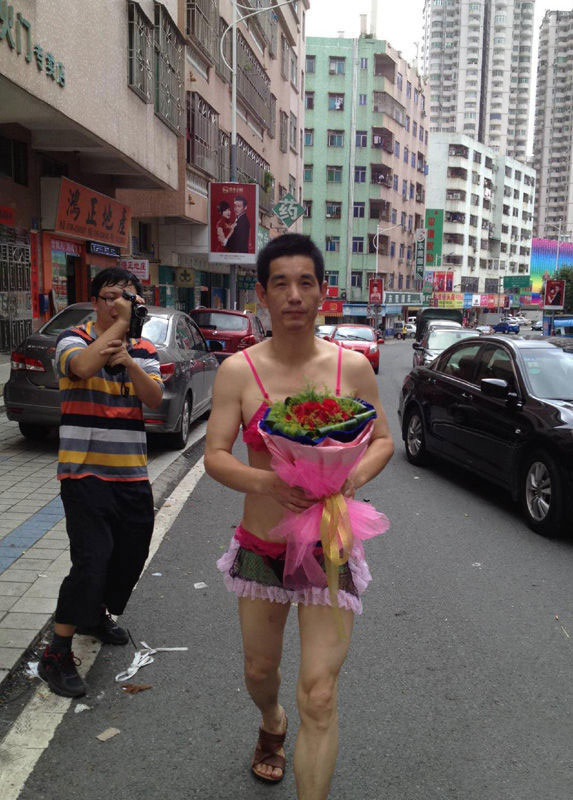-
IP addresses are NOT logged in this forum so there's no point asking. Please note that this forum is full of homophobes, racists, lunatics, schizophrenics & absolute nut jobs with a smattering of geniuses, Chinese chauvinists, Moderate Muslims and last but not least a couple of "know-it-alls" constantly sprouting their dubious wisdom. If you believe that content generated by unsavory characters might cause you offense PLEASE LEAVE NOW! Sammyboy Admin and Staff are not responsible for your hurt feelings should you choose to read any of the content here. The OTHER forum is HERE so please stop asking.
You are using an out of date browser. It may not display this or other websites correctly.
You should upgrade or use an alternative browser.
You should upgrade or use an alternative browser.
- Joined
- May 17, 2012
- Messages
- 177
- Points
- 0
<iframe src="//www.youtube.com/embed/SFdr4gWsGog?rel=0" allowfullscreen="" frameborder="0" height="480" width="853"></iframe>
China's Professional Trolls, the 50 Cent Brigade! | China Uncensored
China Uncensored · 242 videos
China's 50 Cent Brigade, sometimes called the 50 Cent Party, are essential professional trolls. It's their job to trawl through websites, both inside and outside of China, and monitor what the public is saying about the regime and draw the conversation away from anything critical of China by instead criticizing the United States, Western involvement in international affairs, or by pointing out the flaws of democracy. China Uncensored gets plenty of these guys. Ironic since Youtube, along with Facebook and Twitter are actually banned in China. So it's not just Sina Webio these guys are on. And since China employs 2 million of Internet monitors, more than the 1.5 million the People's Liberation Army, this is clearly a new form of cyber warfare. The weapons are hacking or virus, but a careful and systematic propaganda push. And Snoopybabe.
- Joined
- May 17, 2012
- Messages
- 177
- Points
- 0
<iframe width="640" height="360" src="//www.youtube.com/embed/mPEaQKFKM6s?rel=0" frameborder="0" allowfullscreen></iframe>
- Joined
- May 17, 2012
- Messages
- 177
- Points
- 0
Mom lies to doctors about her son's HIV condition
Shanghai Daily, May 7, 2014
A mother who rushed her 4-year-old son to hospital after he suffered a serious head injury has been criticized for not telling medics that the child has HIV.
Two doctors and four nurses who treated the boy in the southern city of Shenzhen tested negative for the virus afterward, but will require monthly tests for the next six months.
The mother, who was not named, said she didn't reveal her child's condition as she feared the Shenzhen doctors would refuse to treat him.
She had been taking her son on a tour when the accident happened, as doctors in his hometown in China's central Hubei Province said he may not live beyond next year.
The child fell and hit his head while playing with family members at Shenzhen Railway Station on April 25 and was rushed to Shenzhen Children's Hospital, Southern Metropolis Daily reported.
His mother told medics there that he had no infectious diseases.
Doctors there tended the boy's wounds, but an x-ray showed bleeding inside his skull and it was decided to operate.
However, a blood test conducted before surgery showed that the little boy was infected with HIV.
Doctor in charge Zhu Fengjun said staff were shocked by this news as none had worn the special protective clothing and equipment stipulated for dealing with people with HIV.
By not disclosing this, the boy's mother had put medical staff in danger as they were in close contact with his blood and other bodily fluids, Zhu said.
"Even though they all wore masks, it is still terribly dangerous if the boy's blood splashed into their eyes. Even his sweat and tears are infectious," he added.
The mother told doctors that she had AIDS and her son had been born with HIV through mother-to-fetus transmission.
She had hidden this at the hospital, fearing her boy would be turned away.
The child was moved into an isolation ward and as the blood inside his skull was being absorbed and he is very weak, it was decided not to operate, said officials.
He left hospital and returned to Hubei with his mother on April 29, where his condition is said to be improving.
Among the medics being tested for HIV is a 21-year-old nurse.
"I haven't told my family as they'd be so worried for me," she said.
- Joined
- May 17, 2012
- Messages
- 177
- Points
- 0
Internet a key tool for drug traffickers
China Daily, May 7, 2014

China continues to experience a rising wave of drug-related crimes, with the Internet serving as a key channel for the underground drug market, an anti-drug official said.
According to the Ministry of Public Security, police uncovered 151,000 drug crimes last year, up 24 percent from 2012.
"The Internet has become an increasingly active platform for the organization and operation of drug abuse and trafficking," Liu Yuejin, director of the ministry's narcotics control bureau, said in an interview.Taiwan, mainland police break drug smuggling case
Criminals also use the Internet to learn how to source material and make drugs illegally, he said.
To fight increasing drug crimes via the Internet, the police launched a nationwide crackdown last summer. In eight days starting on July 29, police arrested 2,120 suspects and smashed 11 drug production centers.
Meanwhile, more drug products are being produced in China instead of being imported. Police smashed 572 drug-processing centers last year, up 75.5 percent from 2012, according to the ministry.
Liu said challenges remain in the fight against drugs, such as a shortage of hands.
There are only 20,000 anti-drug police officers nationwide, and they are strained under the heavy and complex anti-drug work. Equipment and infrastructure for narcotics control also need to be updated, Liu said.
To intensify the crackdown on drugs, the police will focus on high-risk areas like Lufeng, a coastal city in Guangdong province, Liu said.
The police will further investigate and target major drug trafficking rings and drug lords in northern Myanmar, and focus on fighting smuggling gangs at the China-Vietnam border, he said.
Li Li, a lawyer from the Beijing Lawyers Society, said a priority is to bring laws up-to-date.
"Our anti-drug laws and regulations are lagging. In practice, punishment is always more lenient than it should be," she said.
Drug abuse, especially involving synthetic drugs, can drive addicts to extreme behavior such as suicide, kidnapping and murder. It can also seriously damage health and spread diseases such as AIDS, Li said.
- Joined
- Jan 29, 2013
- Messages
- 257
- Points
- 0
409 punished in China's election fraud
Xinhua, May 9, 2014
A total of 409 former officials in central China's Hunan Province have been punished for electoral fraud, local authorities said Friday.
Of the remaining 57 of the 466 under criminal investigation, 39 have been handed over to judicial authorities and 18 are still being investigated, according website of Hunan discipline inspectorate.
On Dec. 28, Hunan provincial legislature disqualified 56 members for buying votes and announced that more than 500 lawmakers in the city had been disqualified, dismissed or had resigned.
An investigation has shown that the 56 provincial legislators offered 110 million yuan (18 million U.S. dollars) in bribes to 518 municipal lawmakers and another 68 staff.
- Joined
- Jan 29, 2013
- Messages
- 257
- Points
- 0
Official: 75% of foreign drugs sold online fake
China Daily, May 9, 2014
China's food and drug authority has issued another warning about overseas drugs sold online, saying that 75 percent of such drugs are counterfeit.
The China Food and Drug Administration said in an online statement on Wednesday that the authenticity of generic anti-cancer drugs sold online cannot have their authenticity and quality guaranteed.
The authority cited an investigation by the drug administration of Shenzhen that said that 75 percent of foreign generic anti-cancer drugs supplied by online agents are fake and ineffective.
Zhi Xiuyi, head of the Lung Cancer Diagnosis and Treatment Center of the Capital Medical University in Beijing, said Chinese cancer patients turn to online agents mainly for cheap generic drugs and foreign new drugs have not yet been approved in China.
“Due to the high cost of developing new drugs and getting patents, many newly developed drugs are very expensive. Yet such drugs are included in the medical insurance systems of the EU and the US," he said.
“Many patients turn to online agents for those drugs because the drugs are too expensive in the domestic market or they are not yet available in the overseas market," he said.
As for generic drugs, most that are sold online are imported from India, he said.
Cancer treatments like Gleevec, which typically cost more than 10,000 yuan ($1,600) a month, are not covered by the medical insurance system, while the cost for the generic treatments is only about 1,000 yuan a month.
An analysis by Doctors Without Borders, an international health organization, suggests India now makes one-fifth of the world's generic drugs, with about 50 percent shipped abroad and sold — often illegally — at a fraction of the cost.
Zhi said the drugs sold by online agents are risky as they are administered without drug authorities' supervision. “Patients can't tell the difference between genuine drugs and fake drugs as it requires technical expertise and equipment."
Peng Donghong, an official with the drug administration of Shenzhen, said the online transactions of drug sales have made it difficult to supervise the market.
According to Chinese regulations, online drugstores can sell only nonprescription medicine, and the stores must obtain authorization from drug authorities.
To keep patients from resorting to generic drugs, the authority should speed up the approval of foreign drugs into the Chinese market and include more anti-cancer drugs in the healthcare system, Zhi said.
“There should be a fast track for anti-cancer drugs developed in the US or EU," he said, adding that it now takes several years for the Chinese drug authority to approve any new drug.
Meanwhile, the authority should expand the category of anti-cancer drugs covered by healthcare programs to make the drugs more affordable.
“It is impossible for the government to absorb the entire cost as the drugs are expensive. Thus the cost should be shared by three parties: the government, the patient and the drugmaker," he said.
- Joined
- May 17, 2012
- Messages
- 177
- Points
- 0
Workers in gold scam at China electronics factory
Staff secretly used gold-plating equipment at the plant and sold the precious metal for more than two million yuan, according to a mainland newspaper report
PUBLISHED : Friday, 09 May, 2014, 5:17pm
UPDATED : Friday, 09 May, 2014, 5:17pm
Keira Lu [email protected]

Police show some of the equipment used in the gold-plating scam. Photo: Chongqing police
A gang of workers in China made more than two million yuan (HK$2.5 million) by secretly using a gold-plating bath at an electronics factory and then selling the precious metal.
The technology is normally used to plate electronic circuitry in phones and computers with a thin layer of gold and the workers were caught after the company in Chongqing got suspicious about how few items the equipment was treating, the Chongqing Morning Post reported.
The leader of the gang learned the plating process when he worked in Shenzhen and taught other staff at the electronics plant when he joined the company in 2011.
They put metal chips in a fist-size gauze bag and sank it to the bottom of the gold-plating bath containing a solution of gold particles and chemicals with a heavy weight.
The metal would sometimes be plated with more than 100 grams of gold in one night, according to the report.
The precious metal was then removed and sold.
The gang leader left the company in 2012, but he continued to lead the operation.
He made more than 400,000 yuan in one six-month period, according to the report.
Seven workers used the technique between September 2012 and October last year at the company, which was not named.
The police found that only workers on the assembly line had access to the gold-plating unit so they asked people in the neighbourhood if staff at the plant had been selling the precious metal.
One of the gang who had been selling gold in the area was identified.
Police have recovered about 1.37 million yuan made in the scam, according to the newspaper.
- Joined
- May 17, 2012
- Messages
- 177
- Points
- 0
Shanghai Students Arrested for Altering Grades of Over 200 Classmates
May 09, 2014

Two Shanghai college students are currently under police detention for hacking into their school’s database and changing the grades of more than 200 classmates.
Chen and Zhang received more than 80,000 RMB for altering the grades of fellow classmates who didn’t want to attend morning PE lessons. The morning exercise classes are compulsory and contribute to students’ overall grade.
The pair originally only hacked into the system to alter their own grades, but after hearing of what they’d done, hundreds of other classmates asked for their assistance in doing the same.
The pair typically charged 15 RMB for each alteration, and were doing very well for themselves until they were caught by school authorities in March. The university informed the police, and the two were subsequently arrested.
- Joined
- May 17, 2012
- Messages
- 177
- Points
- 0
Husband Refuses to Have Sex for Six Years: Wife Files for Divorce
May 08, 2014

A frustrated woman in Jiaxing, who is still a virgin after six years of marriage, finally threw in the towel and filed for divorce.
A Wei and Xiao Ling, who were middle school classmates, had always liked each other and when they graduated from university in 2008 decided to get married. Their parents were delighted and were eager for them to start a family young. A Wei helped out with the family business and it looked like the couple was headed towards a happy future together.
Xiao Ling told the judge that A Wei deliberately avoided his wife by staying out late and would only come into the room after Xiao Ling had fallen asleep, meaning the couple never consummated their six year marriage. Xiao Ling, believing that her husband suffered from some kind of psychological problem tried to get him to see a doctor but he refused.
Xiao Ling even got medical proof that she was still a virgin and used it as evidence in court. Under the mediation of the judge, a divorce was eventually granted.
- Joined
- May 17, 2012
- Messages
- 177
- Points
- 0
<iframe width="640" height="480" src="//www.youtube.com/embed/zQfoxz6-qng?rel=0" frameborder="0" allowfullscreen></iframe>
- Joined
- May 17, 2012
- Messages
- 177
- Points
- 0
we are tiongs.
Last week, my wife and I were at a resort in Kuantan. Met a couple, husband is a Malaysian Chinese staying in Pekan whilst his wife is from Shenzhen. She was criticizing the way China is occupying and claiming those sea lanes in South and East Asia. She was saying that if indeed those areas are China's, then they should be claimed long ago, why wait until now?
There are also many other instances where she was against the actions by the Mainland Chinese. For example, she told me about the recent child urinating menace in Hongkong. She said that there was a public toilet in a building just across the road and a only few steps away, but yet the Mainland mother just allowed her child to urinate in the open on the street instead.
I told her husband that she's the first Mainland Chinese I have come across to criticize her own country's doings. I told him that he had picked the correct spouse indeed.
There are also many other instances where she was against the actions by the Mainland Chinese. For example, she told me about the recent child urinating menace in Hongkong. She said that there was a public toilet in a building just across the road and a only few steps away, but yet the Mainland mother just allowed her child to urinate in the open on the street instead.
I told her husband that she's the first Mainland Chinese I have come across to criticize her own country's doings. I told him that he had picked the correct spouse indeed.
Last edited:
11 jailed for selling toxic dog meat
Xinhua, May 14, 2014
Eleven people in central China's Hunan Province were sentenced to prison for allegedly selling poisonous dog meat, local authorities said Wednesday.
The verdict was handed down by the court of Dingcheng District in Changde City on Tuesday and the defendants were sentenced to imprisonment of one to seven years. They were also fined.
According to the court, since the beginning of 2013, the defendants killed about 1,000 dogs in the countryside with darts covered in highly toxic chemicals and stored the dog meat in a freezer.
The local police caught the suspects and seized 12 tonnes of frozen meat last December. Meat of approximately 10 dogs had been sold.
The poison was identified as succinylcholine chloride. Experts said humans can be poisoned by eating large amounts of the affected meat.
China seizes 956 smuggled pangolin carcasses
Xinhua, May 14, 2014
Border police in south China's Guangdong Province have seized hundreds of dead pangolins while busting a wildlife trafficking case, local authorities said on Tuesday.
The police found 956 pangolin carcasses weighing a total of nearly four tonnes hidden in 189 cool boxes on Monday.
They were acting on a tip-off that that some people had been smuggling endangered animals. They identified a trafficker's driving path, stopped the suspect vehicle and arrested the driver on the spot.
"This is one of the biggest pangolin trafficking cases in China," a border policeman said. The case in still under investigation.
Pangolins, which are under second-class state protection in China, are often smuggled because their meat is considered a delicacy and their scales are believed to have medical qualities.
Under China's criminal law, those who illegally catch, kill, buy or sell endangered wild animals on the state's key protection list could face more than 10 years in jail and fines.
Corruption cases rise 24%
China Daily, May 14, 2014
Procuratorate agencies investigated 8,222 corruption cases in the first quarter of this year, up by 24 percent year-on-year, the Supreme People's Procuratorate said on Wednesday.

Luxury items given as bribes to government officials will be auctioned in Wenzhou, East China's Zhejiang province, according to local anti-graft officials, on May 4, 2013. [Photo/Asianewsphoto]
Those cases involve 10,840 officials, an increase of 19.8 percent. Major cases take up 82.2 percent of the total, numbering 6,759. Among the officials investigated, 57 are above the bureau level, the SPP said.
In the first three months, prosecutors nationwide also handled 2,245 cases of dereliction of duty, up by 10.2 percent.
A total of 1,270 of those cases are major cases involving officials whose levels are higher than or equal to the county head. Bureau level officials investigated have increased year on year by 750 percent to 17.
Over 10,000 officials probed for corruption in Q1
China.org May 15, 2014
China's Supreme People's Procuratorate (SPP) said Wednesday that more than 10,000 officials were investigated for corruption from January to March.
Investigative work covered corruption, dereliction of duty and other duty-related crimes in the first three months of the year.
The number of corruption cases and officials being investigated increased by 24 percent and 19.8 percent, respectively, compared to the same period last year.
The number of dereliction of duty cases and officials being investigated increased by 10.2 percent and 12.7 percent, respectively, compared to the same period in 2013, according to the SPP's data.
A total of 10,840 people in 8,222 cases were investigated for bribery or corruption, and 3,073 people were investigated in 2,245 cases of dereliction of duty, the SPP said.
The increases were due to China's enhanced fight against corruption. Chinese President Xi Jinping has said the country will fight both "flies," officials at grassroots level, and "tigers," high-ranking officials.
Among the total number of officials being investigated for corruption from January to March, 57 were at prefectural level, the SPP said.
Major cases investigated included Tong Mingqian, a senior political advisor in the central province of Hunan, Chen Baihuai, a vice ministerial-level official in Hubei Province, and a large-scale election fraud in Hengyang City of Hunan Province.
Xu Jinhui, director of the SPP's anti-bribery and corruption department, said procuratorates have strengthened their efforts in investigating cases, and efficiency was also improved.
Xu said the SPP will further strengthen its efforts in the anti-corruption drive, focusing on bribe taking, pursuing stolen money and escaped suspects.
In addition, the supreme procuratorate will also strengthen law enforcement standards, strictly implementing audio and video recording during interrogations, Xu said.
In cases involving dereliction of duty, the SPP will focus on food safety, environmental protection, production safety as well as other areas.
Mafia-style gang sentenced in Guangdong
Xinhua, May 16, 2014
A Chinese court has sentenced 27 mafia-style gang members to up to 20 years in jail after convicting them of intentionally causing injuries, illegal detention and owning explosives among other crimes.
Hu Weixing, leader of the gang and chairman of a local real estate development company, got 20 years in jail and 26 others received jail terms ranging from one year and seven months to 19 years, said the Intermediate People's Court of Guangzhou, in the capital of south China's Guangdong Province, on Thursday.
In the first-instance verdict, the court ruled that the trial of four gang members should be terminated as the time limit for prosecutions concerning their crimes had been exceeded. Three others were exempted from criminal penalties as their criminal activities were minor.
Since 2004, Hu gathered his family members and other ex-convicts to carry out such illegal activities as coercive land requisitions, operation of gambling houses, illegal injuries and provocations, said the court.
He was convicted of injuring one person seriously and two slightly, beating and illegally detaining others, owning explosives and destroying public and private properties.
In July 2004, Hu asked three people to slash Hu Yuhui with knives in revenge for the victim's reporting of his criminal activities to authorities. The three were later paid by Hu.
In March 2010, Hu hired others to pour sulfuric acid onto the back of a local judge surnamed Ke, who had presided over a lawsuit that Hu lost. The judge was slightly injured in the attack.
Hu and others gained profits of 48 million yuan (7.8 million U.S. dollars) through casinos they set up between 2011 and 2012, according the court.
Hu was detained with other members in June 2012 in a police raid of his company. The gang members stood trial in February this year.
Man sentenced to death for cross-border child-trafficking
Xinhua, May 16, 2014
A man from southwest China's Guangxi Zhuang Autonomous Region has been sentenced to death for child trafficking, while his 23 accomplices were jailed.
The Intermediate People's Court of Fangchenggang in Guangxi ruled on Friday that Huang Qingheng would also have all his assets confiscated in addition to the death sentence.
Huang Manli, another member of of the child-trafficking gang, was sentenced to life imprisonment, while her personal assets were confiscated and she was deprived of her political rights.
The other 22 members of the gang were given jail terms ranging from one year and 10 months to 15 years.
The gang were prosecuted for having trafficked 23 babies or children from Vietnam and sold them to buyers in Guangdong Province since 2010.
Among the trafficked kids, 11 have been rescued by Chinese police, while the other 12 are yet to be found.
Plumber proposes in pink lingerie
CRI, May 16, 2014
A man from south China's Dongguan managed to grab the attention of pedestrians after he went out onto a street wearing pink lingerie, holding a rose bouquet on May 14, 2014. The 40-year-old plumber was apparently on his way to propose to his girlfriend.

A man surnamed Lian sets out to propose to his girlfriend whilst wearing pink lingerie in Dongguan, south China's Guangdong province, May 14, 2014. [Photo/sina.com.cn]
When the man surnamed Lian proposed to his girlfriend for the first time, he was told that he should "wear female underwear when proposing". He appears to have followed the instructions accordingly.
Lian and his girlfriend surnamed Liao have been in a relationship for two years. They started dating when Liao called him in to help with the plumbing in her apartment when it was being renovated.
A report on nandu.com says Liao, about 30 years old, is an accountant in Shenzhen with an annual income of around 100,000 yuan. She studied in the UK for 10 years.
Though their economic gap remains, the couple believe that love conquers all.
Similar threads
- Replies
- 2
- Views
- 214
- Replies
- 0
- Views
- 437
- Replies
- 11
- Views
- 2K
- Replies
- 15
- Views
- 3K
- Replies
- 5
- Views
- 321
